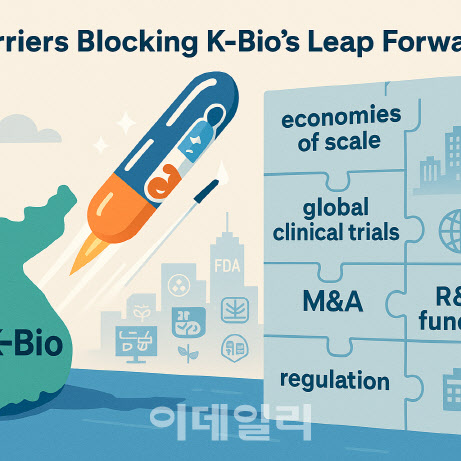[By Yoo Sung, Head of Bio Platform Center, Edaily] SEOUL, South Korea. If there is one topic that has defined the global pharmaceutical and biotech industry this year, it is unquestionably “obesity drugs,” which are shaking up the world. The meteoric rise of obesity treatments as global mega-hits shows just how rapidly pharmaceutical technology is advancing.
Among the many therapeutic areas, obesity drugs are widely regarded as one of the most difficult to develop. Once patents on blockbuster original drugs expire, generics usually flood the market. But given the high development hurdles in obesity treatment, experts say it will not be easy for generic versions to follow.
In this high-difficulty field, there is a Korean company that is steadily emerging as a true “game changer”: Hanmi Pharm. Co., Ltd. (hereafter Hanmi Pharmaceutical). The biggest weakness of existing obesity drugs such as Mounjaro and Wegovy is muscle loss. They clearly take the weight off, but patients have not been able to avoid the side effect of losing muscle mass along with fat.
Although it is a latecomer, Hanmi Pharmaceutical has zeroed in on this Achilles’ heel of current obesity treatments and is developing a first-in-class innovative drug that not only reduces body weight but actually increases muscle mass. This month, Hanmi Pharmaceutical received clearance from the U.S. Food and Drug Administration (FDA) for an investigational new drug (IND) application to begin a Phase I clinical trial of this obesity therapy. If Hanmi’s candidate reaches successful commercialization, it is expected to capture a significant share of the global obesity drug market, which is projected to reach around 100 trillion won in the not-too-distant future.
 | | Image by ChatGPT |
|
In the broader K-Bio landscape, there are many companies that, like Hanmi Pharmaceutical, have already demonstrated their capacity to grow into genuine global players, brightening the outlook for Korea’s economy. ALTEOGEN Inc., now almost synonymous with license-out deals for platform technologies; Samsung Biologics Co., Ltd., a world-class leader in contract development and manufacturing (CDMO); and Celltrion Holdings Co., Ltd., a dominant global force in biosimilars, are among the most representative examples.
With these companies at the forefront, K-Bio is rapidly raising its profile on the global stage and firmly establishing itself as a key growth engine for the Korean economy. Yet the path to a full-fledged global leap for K-Bio is littered with obstacles.
Above all, achieving economies of scale is an urgent priority if Korean companies are to carry new drug development all the way through to in-house commercialization. Independently conducting global clinical trials requires at least several hundred billion won in funding, and companies must be able to shoulder these costs. Given the current size of most K-Bio firms, it is realistically difficult for them to take a new drug from development to full commercialization on their own.
To overcome this, full-scale consolidation and alliances within K-Bio are essential. Only when mergers and acquisitions (M&A) among biopharma companies become active can K-Bio quickly bulk up. Considering not only the costs from discovery to commercialization but also the fact that the process typically takes more than 10 years, M&A is the most efficient?and in practical terms, virtually the only?solution, rather than relying solely on organic growth.
The government, for its part, should step up as a prime mover in expanding M&A among K-Bio companies by rolling out bold incentives such as tax benefits and R&D support. In addition, for companies conducting Phase III clinical trials?which account for the bulk of new drug R&D costs?the government should concentrate public research funding to help bring global blockbuster drugs to market.
Right now, K-Bio finds itself in an “ilmoodowon” (日暮途遠) situation: the sun is setting, but the road ahead is still long. The shortcut to the destination is already in sight. If we choose to ignore it, a true global leap for K-Bio will remain nothing more than wishful thinking.











